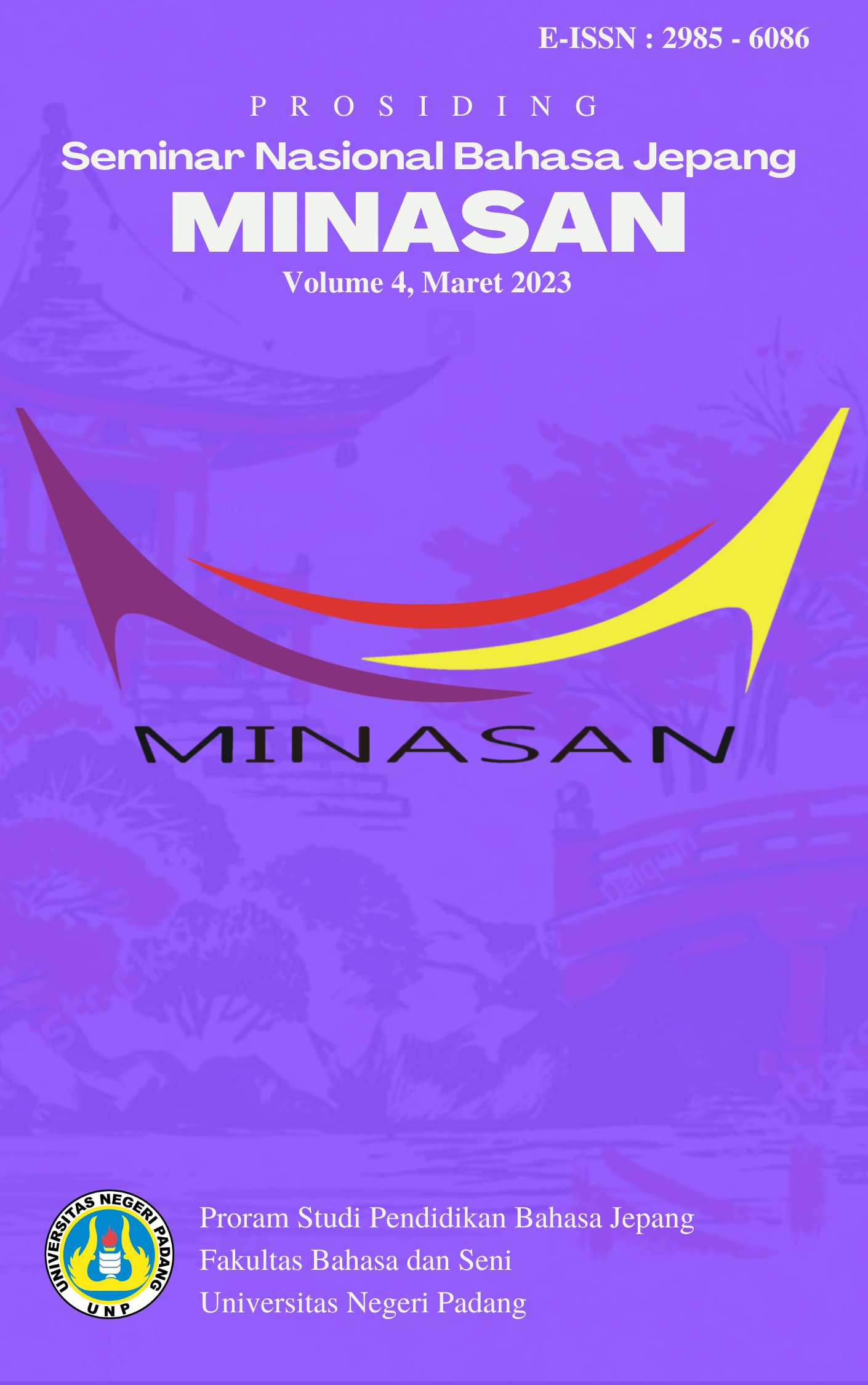Problem Hierarki Kebutuhan pada Tokoh Oba Yozo dalam Novel Ningen Shikkaku Karya Osamu Dazai
Kata Kunci:
Ningen Shikkaku, Osamu Dazai, the hierarchy of needs, Abraham Maslow, neurotic-needsAbstrak
Ningen Shikkaku is a novel by Osamu Dazai, then translated into Bahasa Indonesia as Gagal Menjadi Manusia, and tells about inner conflict experienced by the main character Oba Yozo. He is described as always having difficulty when it comes to judging the good or bad or the immorality of the actions he takes. It can be assumed these conditions occur because, in his life, there are complicated problems in fulfilling a number of basic-needs and meta-needs. This research will answer a question: How is the problem of hierarchy of needs experienced by Oba Yozo’s character which leads him to attempt to fulfill neurotic-needs? This research uses the theory of humanistic psychology developed by Abraham Maslow. The method of this research is qualitative-descriptive. The results of this study are, although although Oba Yozo's physiological needs fulfilled, a serious problem is how fulfilling safety-needs because he was a victim of father superiority and sexual harassment by housekeeper. The trauma becomes an obstacle to the fulfillment of other needs such as the need for love and self-esteem from the environment, because he becomes cynical, anxious, and afraid of every human being, including himself. It is the problem of the hierarchy of needs that does not allow Yozo to self-actualize, so that his life journey actually leads to the fulfillment of neurotic needs such as alcohol consumption, free sex, morphine, the estuary of which is a feeling of despair and repeated suicide attempts
Referensi
Alwisol. (2012). Psikologi Kepribadian (Edisi Revisi). Malang: UMM Press.
Arrachman, M. H., & Mintarsih. (2016). Tipe Bunuh diri pada Tokoh Utama Oba Yozo dalam Novel Ningen Shikkaku Karya Osamu Dazai Ditinjau Berdasarkan Tipologi Bunuh diri Durkheim. E-Journal Sastra Bahasa Jepang, 3(2), 99–106.
Dazai, O. (2021). Gagal Menjadi Manusia (Ningen Shikkaku). Tangerang: Mai.
Faruk. (2017). Metode Penelitian Sastra: Sebuah Penjelajahan Awal. Yogyakarta: Pustaka Pelajar.
Francks, P. (2009). Inconspicuous Consumption: Sake, Beer, and the Birth of the Consumer in Japan. The Journal of Asian Studies, 68(1), 34–42. Diambil dari https://doi:10.1017/S0021911809000035
Hijiya, Y. (2013). A Religion of Humanity: A Study of Osamu Dazai’s No Longer Human. Critique: Studies in Contemporary Fiction, 18(2), 34–42. Diambil dari https://doi.org/10.1080/00111619.1974.10690061
Kamei, S. (1981). The Kiss and Japanese Culture after World War II. Comparative Literature Studies, 18(2), 114–123. Diambil dari https://www.jstor.org/stable/40246247
Khurana, N. (2018). Wars, Words, and Identities in No Longer Human by Osamu Dazai and Steppenwolf by Hermann Hesse. IJELLH: International Journal of English Language, Literature in Humanities, 6(11), 501–509.
Koswara, E. (1991). Teori-Teori Kepribadian. Bandung: PT Eresco.
Kurniawan, W. (2021). Jorge Luis Borges, Realisme Magis, dan Filsafat. Yogyakarta: Basabasi.
Maslow, A. (2017). Motivation and Personality (Motivasi dan Kepribadian). Yogyakarta: Cantrik.
Minderop, A. (2016). Psikologi Sastra: Karya Sastra, Metode, Teori, dan Contoh Kasus. Jakarta: Buku Obor.
Mulyadi, B. (2018). Fenomena Joshi Kosei dalam Kehidupan Masyarakat Jepang. Kiryoku, 2(1), 41–50. Diambil dari https://doi.org/10.14710/kiryoku.v2i1.41-50
Nugroho, B. S., & Rokhman, Muh. A. (2019). Postwar Japanese Adoption of American Culture in Lynne Kutsukake’s The Translation of Love: A Postcolonial Approach. RUBICON: Journal of Transnational American Studies, 6(2), 139–149. Diambil dari https://doi.org/10.22146/rubikon.v6i2.61495
Nurgiyantoro, B. (2013). Teori Pengkajian Fiksi. Yogyakarta: UGM Press.
Ong, S. (2019). Seikatsu Kaizen: Reformasi Pola Hidup Jepang. Jakarta: Elex Media Komputindo.
Partanen, J. (2006). Spectacles of Sociability and Drunkenness: On Alcohol and Drinking in Japan. SAGE Journals, 33(2), 177–204. Diambil dari https://doi.org/10.1177/009145090603300202
Putri, D. N. (2017). Dampak Relasi Tokoh Ayah dan Horiki Terhadap Kondisi Psikologis Yozo dalam Novel Ningen Shikkaku Karya Dazai Osamu. Japanology, 6(1), 52–60.
Setiawan, H. (2014). Manusia Utuh: Sebuah Kajian atas Pemikiran Abraham Maslow (Edisi Elektronik). Yogyakarta: Kanisius.
Stanton, R. (2012). Teori Fiksi Robert Stanton. Yogyakarta: Pustaka Pelajar.
Taylor, S. J., Bogdan, R., & de Vault, M. L. (2016). Introduction to Qualitative Research Methods: a Guidebook and Resource. New Jersey: John Wiley & Sons, Inc.
Teeuw, A. (2015). Sastra dan Ilmu Sastra. Bandung: Pustaka Jaya.
Tumundo, G. A. (2008). The Main Character’s Perception of The Existence of Human Being in Osamu Dazai’s No Longer Human. Skripsi. Yogyakarta: Depertemen Pendidikan Bahasa dan Seni Universitas Sanata Dharma.
Wellek, R., & Warren, A. (2014). Teori Kesusastraan. Jakarta: Gramedia.
Unduhan
Diterbitkan
Terbitan
Bagian
Lisensi
Hak Cipta (c) 2023 Ilham Rabbani, Hatindriya Hangganararas

Artikel ini berlisensi Creative Commons Attribution 4.0 International License.







